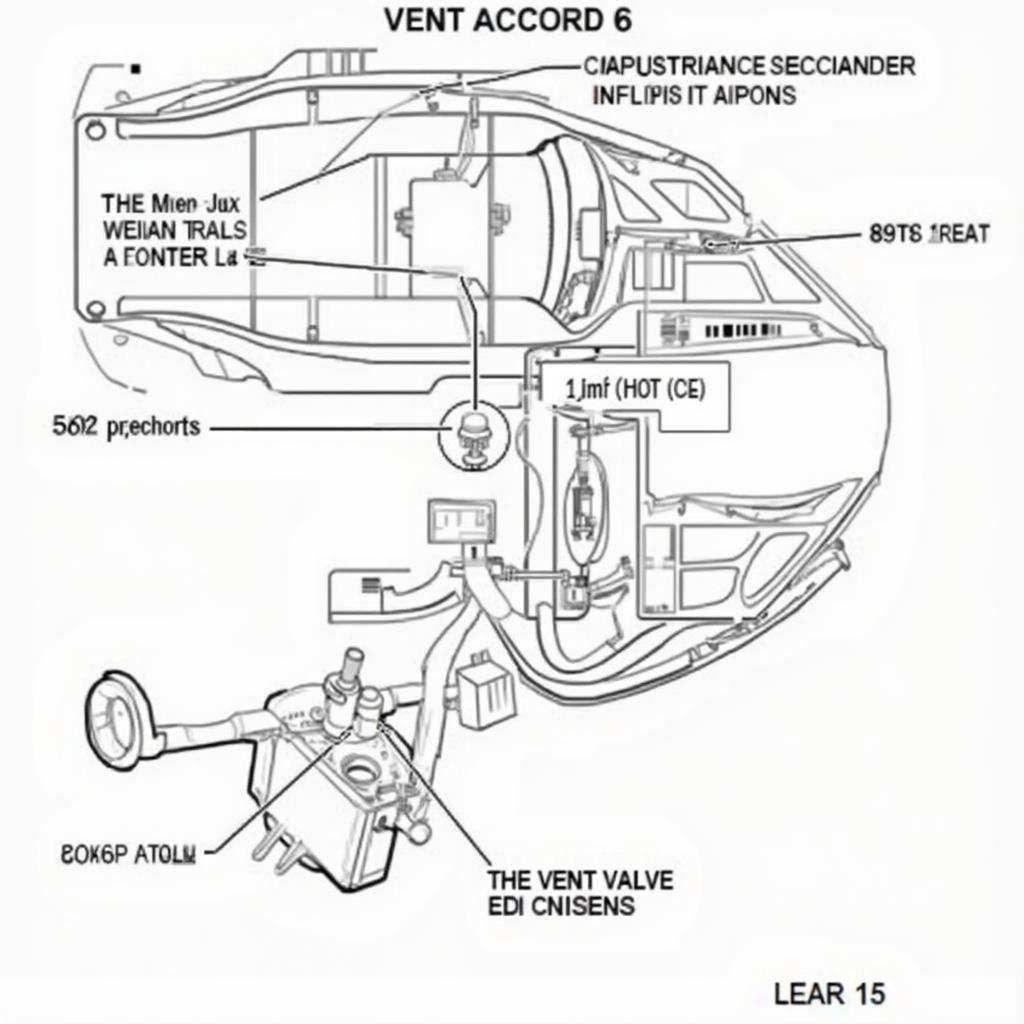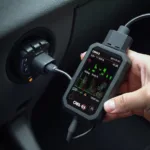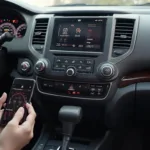The dreaded P2422 code on your 2008 Honda Accord can be a source of frustration. This article will delve into everything you need to know about the P2422 code, from its meaning and causes to diagnostic steps and solutions. We’ll empower you to understand this troublesome code and get your Accord back on the road.
Understanding the P2422 Code: Evaporative Emission System Vent Valve Stuck Closed
The P2422 Diagnostic Trouble Code (DTC) indicates a problem with your vehicle’s Evaporative Emission Control System (EVAP). Specifically, it signifies that the EVAP Vent Valve is stuck closed. This valve is crucial for regulating the pressure within the EVAP system, which prevents fuel vapors from escaping into the atmosphere.
Causes of the P2422 Code in a 2008 Honda Accord
Several factors can contribute to a stuck closed EVAP Vent Valve in your 2008 Honda Accord:
- Faulty EVAP Vent Valve: The valve itself may be malfunctioning due to internal mechanical or electrical issues.
- Wiring Problems: Damaged or corroded wiring connected to the vent valve can disrupt its operation.
- Blocked Vent Hose: A clogged or kinked vent hose can restrict airflow and cause the valve to appear stuck.
- EVAP Canister Issues: Problems with the EVAP canister, such as a blockage, can also trigger the P2422 code.
- PCM Malfunction: In rare cases, a faulty Powertrain Control Module (PCM) can misinterpret signals and incorrectly set the P2422 code.
 2008 Honda Accord EVAP System Diagram
2008 Honda Accord EVAP System Diagram
Diagnosing the P2422 Code
Accurately diagnosing the root cause of the P2422 code is essential for effective repair. Here’s a step-by-step guide:
- Retrieve the Code: Use an OBD2 scanner to confirm the P2422 code.
- Inspect the Vent Valve: Visually inspect the EVAP Vent Valve for any signs of damage or corrosion. Check the wiring harness for any breaks or loose connections.
- Check the Vent Hose: Inspect the vent hose for kinks, blockages, or damage.
- Test the Vent Valve: Use a multimeter to test the valve’s electrical operation.
- Inspect the EVAP Canister: Check the EVAP canister for cracks or leaks.
- Check the PCM: If all other components check out, the PCM may need to be tested and potentially reprogrammed.
Fixing the P2422 Code: Solutions and Repairs
Once you’ve identified the cause of the P2422 code, you can proceed with the appropriate repair:
- Replace the Vent Valve: If the valve is faulty, replacing it is the most common solution.
- Repair Wiring: Repair or replace any damaged or corroded wiring.
- Clear Blockages: Clear any blockages in the vent hose or EVAP canister.
- Replace the EVAP Canister: If the canister is damaged, it will need to be replaced.
- Address PCM Issues: If the PCM is faulty, it may require reprogramming or replacement.
What happens if I ignore the P2422 code?
Ignoring the P2422 code could lead to further issues, including increased emissions, reduced fuel efficiency, and potential damage to other EVAP system components.
“Addressing the P2422 code promptly not only helps protect the environment but also ensures your vehicle runs efficiently,” advises Michael Carter, ASE Certified Master Technician.
2008 Honda Accord OBD2 P2422 Code: FAQs
Q: Can I drive my car with a P2422 code?
A: Yes, you can usually drive your car with a P2422 code, but it’s best to address the issue as soon as possible.
Q: How much does it cost to fix a P2422 code?
A: The cost can vary depending on the specific repair needed, but it typically ranges from $100 to $400.
Q: Can I fix the P2422 code myself?
A: With some basic mechanical skills and tools, you may be able to fix the P2422 code yourself.
Conclusion
The P2422 code in your 2008 Honda Accord signals a problem with your EVAP system’s vent valve. By following the diagnostic steps outlined in this article and addressing the root cause, you can resolve this issue and ensure your Accord runs smoothly and efficiently.
“Regular maintenance and prompt attention to diagnostic trouble codes can help prevent more serious and costly repairs down the road,” adds Sarah Miller, Automotive Diagnostics Specialist.
For further assistance or if you have any questions, feel free to contact our 24/7 customer support team via WhatsApp: +1(641)206-8880, Email: [email protected].

